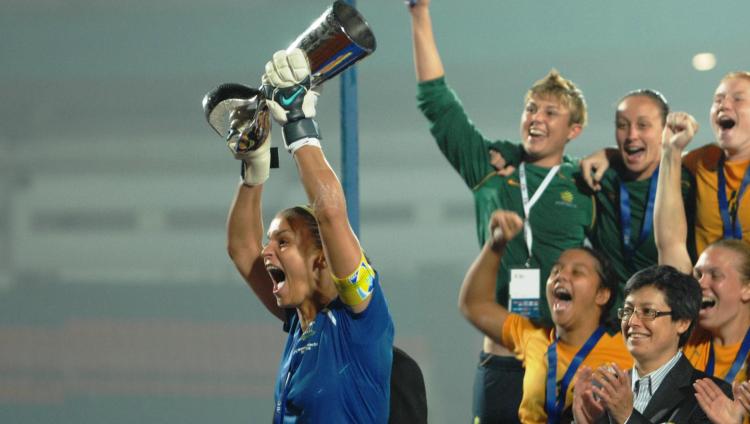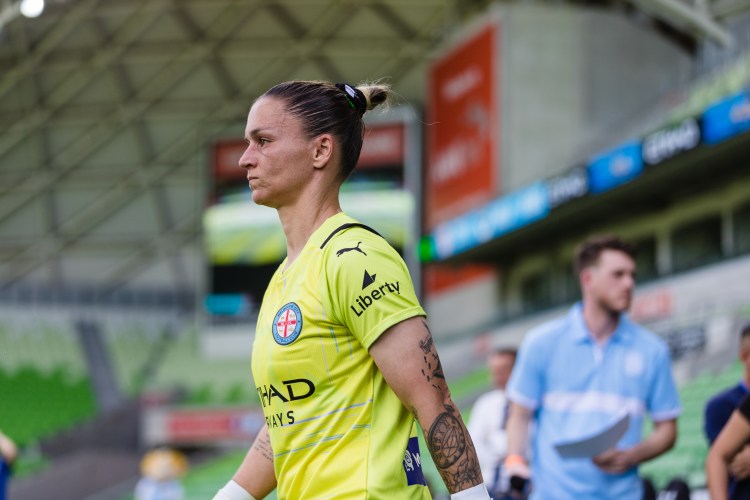On the 7th of February 1997, a 16-year-old Melissa Barbieri stepped into midfield for ITC Victoria to make her professional debut against the ACT Academy of Sport in the Women’s National Soccer League; two teams that no longer exist, playing in a competition that no longer exists, jointly succeeded by a player who has, by contrast, become eternal. It was a different era, a different landscape of Australian football, and yet, Barbieri has been there for it all.
“I was just playing football, having fun,” the now 41-year-old says of her teenage self, “I didn’t know the magnitude of it.”
Like so many of her peers from her generation, much of Barbieri’s early football life was spent scrapping it out against the boys at school or her local team, with the Matildas legend recounting a familiar story of her boundless desire to play football, regardless of barriers faced or the social norms of the time.
She begins, “The distinct memories of me playing in the boys’ team as a youngster were pretty pinnacle in how I felt about the game.
“I absolutely fell in love with football and I love so many things that weren’t stereotypically female – I like motorbikes, I liked playing in the dirt, picking up snails, doing all those sorts of things.
“I just thought football was going to be another thing that I wasn’t allowed to do or I wasn’t allowed to be seen to do.”
Though the next step in Barbieri’s journey is another familiar tale, the discovery of opportunities to keep playing the sport after being unable to continue with the boys’ teams, her description of how that made her feel isn’t as often spoken about.
“It was another pinnacle moment where I thought, ‘hold on, I’m actually angry now because I’ve missed out on all these years of playing the game that I absolutely adore’,” she says, “So when I was 14, I actually thought, ‘you know what? I can make a go at this’.”
And, with the same determination and mental fortitude that personifies her as a goalkeeper, leader and individual today, ‘make a go of it’ she did, receiving a national team call-up within two years of that decision.
Selected to the squad as a midfielder, a position she played until she was 20 when injuries cut short her outfield career, Barbieri describes being quickly humbled as a precocious teenager in a senior international set-up.
“I was kind of big headed at the time,” she said, “But then soon enough I found out that it was quite difficult with the older players and how good a lot of the older players were.”
In September 2002, by then having donned the gloves and relocated to her new position between the sticks, Barbieri made her Matildas debut in a 1-0 win over Canada.
After 25 years in the game, Barbieri naturally has many treasured memories, yet it’s this senior international debut that she goes to first as she lists some of her personal highlights.
“I’ll have to say the two key moments – or maybe three. The first was my debut in Canada where I kept a clean sheet and made a save in the last few minutes to keep that a clean sheet,” she starts, “The 2010 Asian Cup win, that was another pinnacle moment, and then also returning in 2015 after becoming a mum and playing in my fourth World Cup with (daughter) Holly.”

Balancing football and family following that 2015 World Cup, Barbieri had a brief playing stint with Melbourne Victory, but committed to the next stage of her footballing life when she arrived at Melbourne City in 2017, taking up the opportunity to step into a playing-assistant coaching role soon after.
With her interest in coaching and mentoring well-publicised, City will undoubtedly continue to benefit from Barbieri’s expertise and leadership, and the Club will in turn continue to provide a second home for the Australian legend.
“Melbourne City is my family and the way that I’ve always been treated at the club, and how the Club treats our female players in general, this is what the standards of the league are held at,” she said.
“I’ve never had the feeling where I walk into a Club and I don’t have to fix anything; I walked into City and I just felt at home.
“I felt at ease. I didn’t feel like I had to change anything or fix anything or fight for anything, it’s just a really comfortable space to be in after fighting for so long for many things.”

Reflecting on her career as a whole, Barbieri recognises that the big picture of her 25 years at the top is composed of smaller moments and memories that she had never realised were happening when they did.
“To be fair,” she started, “I think this is just the culmination of all those small moments coming together.
“Sometimes when you’re looking to the future all the time you forget to look back and see how far you’ve come.
“I think I’ve always just taken each year as it comes and you just build on it and build on it, and then suddenly you look back and it’s 25.”





